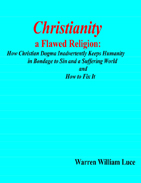
 |
Christianity a Flawed Religion: How Christian Dogma Inadvertently Keeps Humanity in Bondage to Sin and a Suffering World and How to Fix It
by Warren William Luce
Lulu
At a certain point in his life, though author Luce enjoyed his churchgoing experience, he began to ponder the true meaning of Christ's teachings. Studying scripture intensively gave him pause. An especially perplexing example was God's admonition, given through David in the Psalms, to allow soldiers to kill Midianite men, women, and children but to "keep the young virgins for yourself." This provoked one of many questions: how could a God who gave a commandment against killing, "condone, let alone bless" such actions? Approaching his minister, the author received answers that seemed dismissive. Luce was finally judged to be a disruptive influence because he harbored such doubts about Christian teaching, was excommunicated, and had to leave the congregation. This freed him, he recalls, to begin searching for spiritual principles that he found were not only intellectually sound but also spiritually satisfying.
The author raises several pertinent questions in this sober analysis: How can a God of love, an omnipotent being, condemn to hellfire those who have never heard of him or who have been taught a different faith? Are humans, as many Christians are taught, innately evil and unredeemable? Why did God, through Jesus, emphasize forgiveness of sins, when he did not forgive his first creations, Adam and Eve, but instead banished them from his paradise? And does redemption come only through belief in the crucifixion and resurrection of Jesus? Luce points out that Jesus stated, before his death, that his work was completed. Jesus did not say that his real work was his death and its aftermath, though that has become a standard, accepted Christian doctrine. The author's examination of Islam also shows many of the same contradictions within it: killing is wrong, except in certain circumstances, allowing for holy wars and other murderous acts at the discretion of believers.
Luce, a nonagenarian and retired Air Force colonel, began his faith life as an adult after surviving the Great Depression and serving in military combat in three wars. This work—part memoir and part philosophical treatise—reflects a serious penchant for contemplation and fact seeking, drawing from many sources and stepping well outside the confines of any one church or denomination. His book covers a remarkable panorama of philosophical, intellectual, religious, and spiritual material. Many people, including devout Christians, question some aspects of their religion and its teachings at some point in their lives. Luce explores his own doubts and findings frankly and at great depth, basing his unique path of speculation and discovery on personal experience, which gives the work warmth and accessibility. He writes not to establish any new sect or draw attention to his evident wisdom but solely to share his findings. He offers a hopeful counsel to readers: our task in realizing the best of all God's blessings is to open our hearts and "practice love, kindness and forgiveness." Luce's conclusions reach well beyond the boundaries of conventional thinking on these significant subjects but are still written in a way to be readily understood. They might prove useful to those seeking a path to spiritual fulfillment.
RECOMMENDED by the US Review